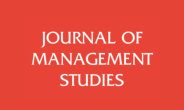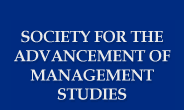
PDW FOR THE SPECIAL ISSUE ON:
“ORGANIZING AND STRATEGIZING IN AND FOR EXTREME CONTEXTS: TEMPORALITY, EMBODIMENT, MATERIALITY”
Tuesday May 3rd, 12.00-1 pm UTC
Led By Guest Editors:
Markus Hällgren, Umeå School of Business, Economics & Statistics, Umeå University, Sweden
Daniel Geiger, University of Hamburg, Germany
Linda Rouleau, HEC Montreal, Canada
Kathleen Sutcliffe, Johns Hopkins University, USA
Eero Vaara, Saïd Business School, University of Oxford, UK
JMS Editor: Elena Dalpiaz, Imperial College, London, UK
PURPOSE AND AGENDA
In the present situation, with the aftermath of a global pandemic, a world that is holding its breath that the Russia-Ukraine war do not escalate into World War 3, extreme weather events, religious extremism, cyber espionage, interferences in democratic elections, and declining trust in democratic systems we may be in what some commentators call an age of ‘normalized unprecedentedness’ (Atwater, 2021). Although we may wish that research on extreme contexts – settings “where one or more extreme events are occurring or are likely to occur that may exceed the organization’s capacity to prevent and result in an extensive and intolerable magnitude of physical, psychological, or material consequences to—or in close physical or psychosocial proximity to—organization members” (Hannah et al. 2009: 898) – should be of little importance, these patterns point to the opposite. Research in this domain is indeed important and critical for increasing society´s ability to cope with the present and future situation at hand (see Williams et al, 2017; Hällgren et al, 2018 for reviews). To address the pressing need to understand such contexts, we organize a special issue, highlighting three themes: temporality, embodiment and materiality.
We recognize that there might be different ways to conceptualize, study and theorize extreme contexts, and the themes. Therefore, by inviting potential contributors to this virtual workshop, we aim to help potential contributors to align with the expectations of the special issue.
The full call for papers and a list of potential themes can be found here: https://onlinelibrary.wiley.com/pb-assets/assets/14676486/SI-OSEC%20Call%20for%20Papers%20Aug%2021-1631023574537.pdf
WORKSHOP FORMAT
Regardless of how much we would like to see you face to face, considering the uncertain times we are currently experiencing, we will organize a virtual workshop. The workshop will start by the special issue editors presenting the theme(s) of the special issue and what they are looking for in potential contributions. Following the presentation, potential contributors are invited to ask questions.
To facilitate the questions and answers, questions could be submitted in advance through the sign-up form https://forms.gle/uxPVoaAPcpUfntkv8 or by emailing markus.hallgren@umu.se (note: if there are too many questions the editors will make a selection based on the perceived needs).
INFORMATION
WHEN: Tuesday May 3rd, 12.00-1 pm UTC
WHERE: A Zoom link will be distributed two days in advance of the workshop. Sign-up here:
https://forms.gle/uxPVoaAPcpUfntkv8 (Sign-up before May 1st)
WHO: Potential contributors to the Special issue on “Organizing and strategizing in and for extreme contexts: temporality, embodiment, materiality”
REFERENCES
Atwater, P. (2021). A dangerous normalisation of unprecedentedness. Financial Times Swamp Notes Newsletter, 19 February
Hannah, S. T., Uhl-Bien, M., Avolio, B. J. and Cavarretta, F. L. (2009). ‘A framework for examining leadership in extreme contexts’. The Leadership Quarterly, 20, 897-919.
Hällgren, M., Rouleau, L., & de Rond, M. (2018). A Matter of Life or Death: How Extreme Context Research Matters for Management and Organization Studies. Academy of Management Annals, 12(1), 111-153.
Williams, T. A., Gruber, D. A., Sutcliffe, K. M., Shepherd, D. A., & Zhao, E. Y. (2017). Organizational Response to Adversity: Fusing Crisis Management and Resilience Research Streams. Academy of Management Annals, 11(2), 733-769.

